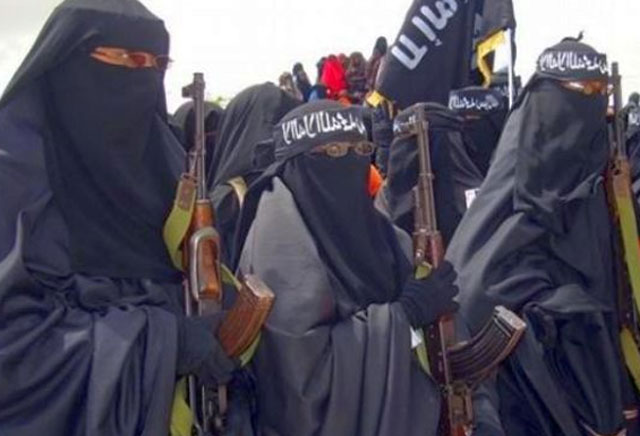
Ninetta Bagarella and her husband, Totò, who successfully raised children in the extremist Mafia tradition. Image credit: Associated Press.
Emilie König, Yasmin Bulbocus, Sadaa Boular each have something in common: all are women of ISIS. Emile is a well-known example of a young French woman who converted to Islam and emigrated to Syria, where she served as a recruiter and propagandist for ISIL, while Yasmin is a former extremist that was radicalized when she was only seventeen. Meanwhile, the case of Safaa Boular, her sister Rizlaine, and her mother Mina, who were found guilty of plotting terrorist attacks in Britain, is a clear example of transmission of dysfunctional values within families. Each has a unique story about how and why they became radicalized, but as a group, they provide fascinating insight into the role women play in ISIS.
As co-leaders, strategists, trainers, advisors, ruthless criminals, and persuaders, women involved with terrorist groups such as ISIS, as well as women in organized crime rings such as the Mafia, often share the same harsh attitudes towards authority and broader society. They reflect the criminal subcultures that raised them, bear unhealthy values, purvey hatred, and act as loyal partners in crime.
Many women of the Mafia pursue their own battle against the State and Civil Society. They are tasked with raising future generations of “men and women of honour,” thus ensuring the survival of their clans and criminal associations. The following conversation took place in the visitors room of the penitentiary where Gianni Riina, the eldest son of the most fierce Sicilian mafia boss Totò Riina, was imprisoned:
Salvo Riina: “See, I’m from the school of Corleone.”
Ninetta Bagarella: “Well, thank goodness, thank goodness.”
Salvo Riina: “My father’s from Corleone, my mother’s from Corleone, what other school and blood could I have?”
Ninetta Bagarella: “Pure blood.”
In this conversation, Ninetta Bagarella, Totò Riina’s wife, clearly expresses her satisfaction after her son Salvo remembers his “pure” Corleonese origins. As a woman, part of her role is to raise children who, like Salvo, have “pure” origins and strong ties to the organization- something which women in ISIS, raising extremist “cubs,” must also do.
The determination they show in pursuing these roles demonstrates that their power is seriously underestimated. Both in extremist groups and in mafia organizations, women make their own contributions in two ways:
- They provide potential extremist women with role models;
- They ensure the survival of criminal systems by raising children with extremist values.
With regard to the first issue, one possible counter-strategy could envisage the creation of narratives that focus on the life stories of women that were formerly involved in criminal organizations and decided to quit. The confrontation with real life examples of women who chose to abandon lives of extremism could help potential extremists develop new ideas and opinions about criminal groups, based on more genuine information.
The second issue presents us with a big challenge: preventing children from being indoctrinated by their parents and families. During the first few years of life, babies are totally dependent on their parents, so it is inconceivable to develop a strategy leaving their mothers or fathers out of their socialization. Instead, it is possible to expose older children to messages of tolerance and peace, using means familiar to them like cartoons, books and songs or planning different operations according to the characteristics of the context.
Ultimately, counterterrorism strategies should just not be “gender-sensitive,” but should be more specifically based on social roles.
This will ensure that the social roles played by women, often overlooked, are finally addressed- and that generations of their children will no longer be raised in lives of crime.
Women are key to counterterrorism efforts, because they play crucial roles in families and educational institutions and thus play a key role in either increasing or mitigating the risk of radicalization. Increasing the participation of women in the prevention of criminal behavior could help tackle the problem at its roots, giving new generations more chances to grow up with positive cultural values that promote social cohesion and solidarity.



